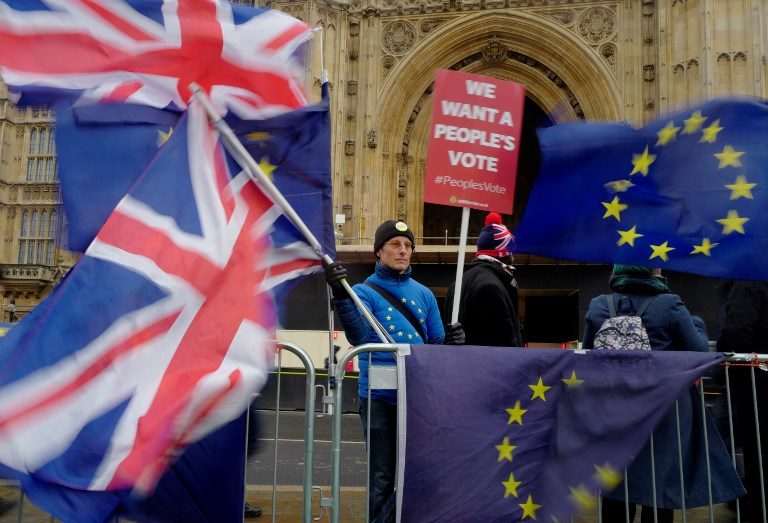SUMMARY
This is AI generated summarization, which may have errors. For context, always refer to the full article.

LONDON, United Kingdom – Members of the British parliament (MPs) seeking to pressure Prime Minister Theresa May this week to renegotiate her Brexit deal should heed EU warnings that it will not succeed, Ireland’s foreign minister warned Sunday, January 27.
Simon Coveney said attempts by Brexit supporters to remove or set a time-limit on a controversial “backstop” clause on the Irish border would never be accepted by Brussels.
“Listen to what people are saying in Europe,” he told BBC television, saying May’s Brexit deal was “a balanced package that isn’t going to change.”
“The European Parliament will not ratify a withdrawal agreement that doesn’t have a backstop in it, it’s as simple as that,” he added.
He was speaking ahead of another showdown between May and the House of Commons over Britain’s withdrawal from the EU, which is scheduled for March 29.
MPs this month rejected the divorce agreement she struck with the block last year.
One Tuesday night, in a series of votes on parliamentary amendments, they will set out what they want her to do next.
Some MPs want to delay Brexit or adopt a whole new strategy, but others are demanding changes to May’s deal that they suggest could allow them to support it.
These focus on the backstop, an arrangement intended to keep open the border between the UK and Ireland by temporarily tying London to the EU’s trade rules.
May has already spent months trying to amend the backstop with no success, but has promised to return to Brussels if that is what her MPs want.
Health Secretary Matt Hancock denied Coveney’s comments meant she could not succeed, telling the same BBC programme that he was taking a “negotiating position.”
He said Dublin did not want Britain to leave the EU without a deal, which is the default position if MPs cannot reach agreement.
The European Commission this week conceded that without a deal, controls would be reimposed on the Irish border, which all sides have warned could undermine the Northern Irish peace process.
“The idea the EU and the Irish government would drive this process to a no-deal exit in order to try to achieve something which is intended to avoid no-deal Brexit, that is not going to happen,” Hancock said.
Coveney repeated that Dublin would be open to amending an accompanying political declaration on future trading ties, to emphasise that the backstop may never be used.
Scrap MPs’ holiday
The rejection of May’s EU deal on January 15 left Britain hurtling towards the exit door with no plan.
If her efforts to salvage her deal fail, Britain runs the risk of severing ties with its closest trading partner overnight, with no new arrangements in place.
Numerous MPs have put forward amendments for debate on Tuesday rejecting this “no deal” scenario, and calling variously for Brexit to be delayed, negotiations be reopened with the EU, or a second referendum.
Increasing numbers of ministers have also warned they will not accept the potentially catastrophic prospect of Britain leaving with no agreement.
May says the best way to avoid this is to agree to her deal, but says Brexit will happen on March 29 either way, and planning continues for every option.
The Sunday Times newspaper raised eyebrows by reporting that officials are looking at what powers they might need in the event of any civil disorder, including imposing martial law.
Hancock confirmed the government was looking at “all the options in all circumstances”, but said martial law “isn’t the focus of our attention”.
Separately, May’s office said it was considering extending House of Commons hours and cancelling MPs’ week-long February holiday to make time to pass all the laws needed to prepare for Brexit.
These include bills relating to trade, fisheries and agriculture, immigration, the environment and healthcare, as well as a law to implement any divorce deal with the EU that MPs might yet agree to. – Rappler.com
Add a comment
How does this make you feel?
There are no comments yet. Add your comment to start the conversation.